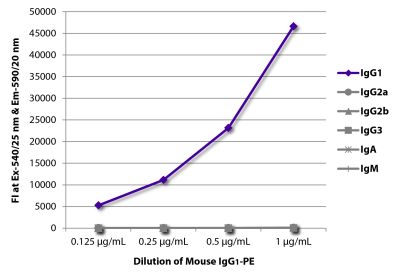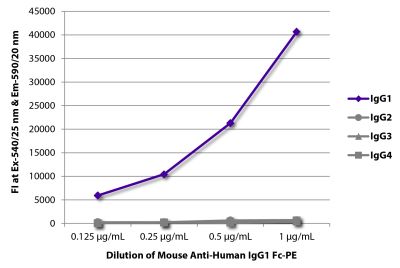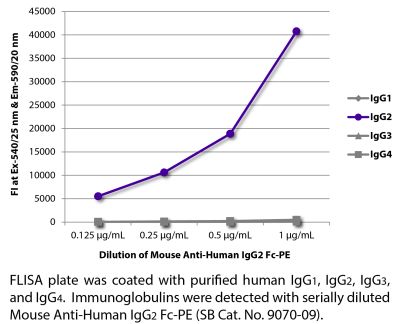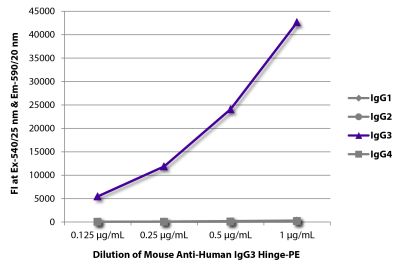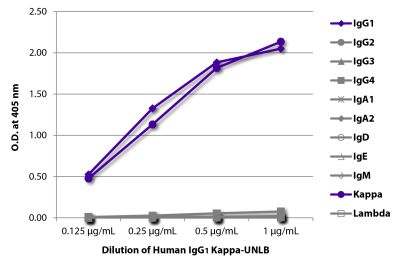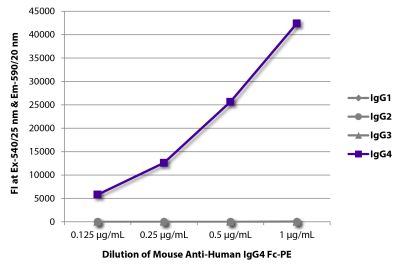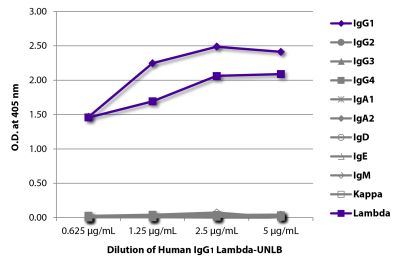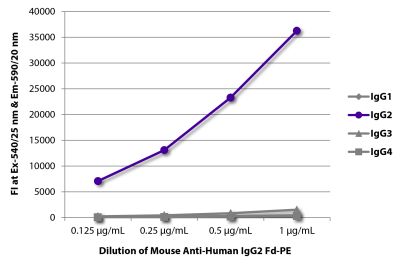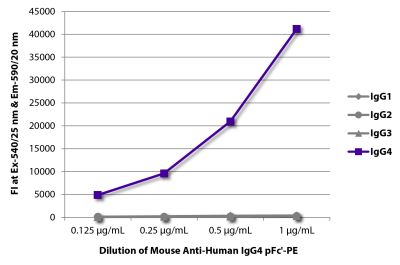Mouse Anti-Human IgG1 Hinge-PE (4E3)
Cat. No.:
9052-09
PE Anti-Human IgG1 Hinge antibody for use in flow cytometry and multiplex assays.
$243.00
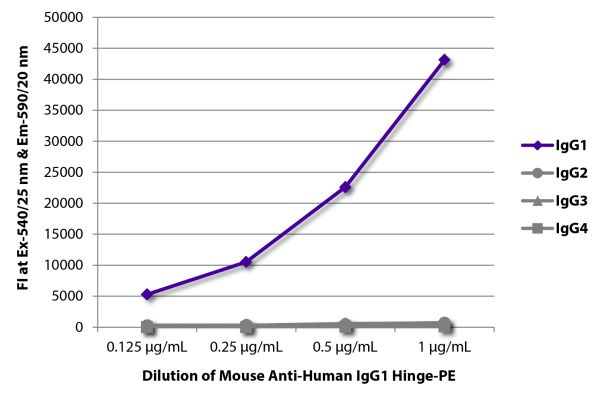

| Clone | 4E3 |
|---|---|
| Isotype | Mouse (BALB/c) IgG1κ |
| Isotype Control | Mouse IgG1-PE (15H6) |
| Specificity | Human IgG1 Hinge |
| Conjugate | PE (R-phycoerythrin) |
| Buffer Formulation | Phosphate buffered saline containing < 0.1% sodium azide and a stabilizer |
| Clonality | Monoclonal |
| Concentration | 0.1 mg/mL |
| Volume | 1.0 mL |
| Recommended Storage | 2-8°C; Avoid exposure to light; Do not freeze |
| Applications |
ELISA – Quality tested 1-7,9 FLISA – Quality tested Flow Cytometry – Reported in literature 13-15 Immunohistochemistry-Paraffin Sections – Reported in literature 8-10 Western Blot – Reported in literature 11,12 Multiplex – Reported in literature 16-19 Separation – Reported in literature 20 Purification – Reported in literature 21 Note – For direct immunostaining of IgG1 positive cells in flow cytometry applications, clone HP6001 (SB Cat. No. 9054) is recommended |
| RRID Number | AB_2796621 |
| Gene ID |
3500 (Human) |
| Gene ID Symbol |
IGHG1 (Human) |
| UniProt ID |
P01857 (Human |
| UniProt Name |
IGHG1_HUMAN (Human) |
Documentation
Certificate of Analysis Lookup
Enter the Catalog Number and Lot Number for the Certificate of Analysis you wish to view
- 1. Whary MT, Sundina N, Bravo LE, Correa P, Quinones F, Caro F, et al. Intestinal helminthiasis in Colombian children promotes a Th2 response to Helicobacter pylori: possible implications for gastric carcinogenesis. Cancer Epidemiol Biomarkers Prev. 2005;14:1464-9. (ELISA)
- 2. Njoku DB, Mellerson JL, Talor MV, Kerr DR, Faraday NR, Outschoorn I, et al. Role of CYP2E1 immunoglobulin G4 subclass antibodies and complement in pathogenesis of idiosyncratic drug-induced hepatitis. Clin Vaccine Immunol. 2006;13:258-65. (ELISA)
- 3. Liu L, Chen M, Yu F, Zhao M, Wang H. IgG subclass distribution, affinity of anti-myeloperoxidase antibodies in sera from patients with Wegener's granulomatosis and microscopic polyangiitis. Nephrology. 2008;13:629-35. (ELISA)
- 4. Xu P, Cui Z, Chen M, Hellmark T, Zhao M. Comparison of characteristics of natural autoantibodies against myeloperoxidase and anti-myeloperoxidase autoantibodies from patients with microscopic polyangiitis. Rheumatology. 2011;50:1236-43. (ELISA)
- 5. Geisler WM, Morrison SG, Doemland ML, Iqbal SM, Su J, Mancevski A, et al. Immunoglobulin-specific responses to Chlamydia elementary bodies in individuals with and at risk for genital chlamydial infection. J Infect Dis. 2012;206:1836-43. (ELISA)
- 6. Shao C, Huo N, Zhao L, Gao Y, Fan X, Zheng Y, et al. The presence of thyroid peroxidase antibody of IgG2 subclass is a risk factor for thyroid dysfunction in chronic hepatitis C patients. Eur J Endocrinol. 2013;168:717-22. (ELISA)
- 7. Haag S, Schneider N, Mason DE, Tuncel J, Andersson IE, Peters EC, et al. Identification of new citrulline-specific autoantibodies, which bind to human arthritic cartilage, by mass spectrometric analysis of citrullinated type II collagen. Arthritis Rheumatol. 2014;66:1440-9. (ELISA)
- 8. Qu Z, Liu G, Li J, Wu L, Tan Y, Zheng X, et al. Absence of glomerular IgG4 deposition in patients with membranous nephropathy may indicate malignancy. Nephrol Dial Transplant. 2012;27:1931-7. (IHC-PS)
- 9. Jia X, Hu S, Chen J, Qu Z, Liu G, Cui Z, et al. The clinical and immunological features of patients with combined anti-glomerular basement membrane disease and membranous nephropathy. Kidney Int. 2014;85:945-52. (ELISA, IHC-PS)
- 10. Qu Z, Cui Z, Liu G, Zhao M. The distribution of IgG subclass deposition on renal tissues from patients with anti-glomerular basement membrane disease. BMC Immunol. 2013;14:19. (IHC-PS)
- 11. Bøe AS, Bredholt G, Knappskog PM, Hjelmervik TO, Mellgren G, Winqvist O, et al. Autoantibodies against 21-hydroxylase and side-chain cleavage enzyme in autoimmune Addison's disease are mainly immunoglobulin G1. Eur J Endocrinol. 2004;150:49-56. (WB)
- 12. Skorstad G, Hestvik AL, Torjesen P, Alvik K, Vartdal F, Vandvik B, et al. GAD65 IgG autoantibodies in stiff person syndrome: clonality, avidity and persistence. Eur J Neurol. 2008;15:973-80. (WB)
- 13. Wang M, Qiu Y, Wang X, Zhao F, Jin M, Xu M, et al. Role of HLA-G and NCR in protection of umbilical cord blood haematopoietic stem cells from NK cell mediated cytotoxicity. J Cell Mol Med. 2011;15:2040-5. (FC)
- 14. Gao B, Moore C, Porcheray F, Rong C, Abidoglu C, DeVito J, et al. Pretransplant IgG reactivity to apoptotic cells correlates with late kidney allograft loss. Am J Transplant. 2014;14:1581-91. (FC)
- 15. Toyoda C, Suzuki Y, Tsuneyama H, Onodera T, Masuno A, Yabe R, et al. Production of human monoclonal anti-Jk3, recognising an epitope including the Jka/Jkb polymorphic site of the Kidd glycoprotein. Transfus Med. 2014;24:286-91. (FC)
- 16. Keynan Y, Bodnarchuk T, Wayne S, Li Y, Fowke KR. Evaluation of influenza-specific humoral response by microbead array analysis. Can J Infect Dis Med Microbiol. 2011;22:25-9. (Multiplex)
- 17. Kaneku H, O'Leary JG, Taniguchi M, Susskind BM, Terasaki PI, Klintmalm GB. Donor-specific human leukocyte antigen antibodies of the immunoglobulin G3 subclass are associated with chronic rejection and graft loss after liver transplantation. Liver Transpl. 2012;18:984-92. (Multiplex)
- 18. Lowe D, Higgins R, Zehnder D, Briggs DC. Significant IgG subclass heterogeneity in HLA-specific antibodies: Implications for pathogenicity, prognosis, and the rejection response. Hum Immunol. 2013;74:666-72. (Multiplex)
- 19. Freitas MC, Rebellato LM, Ozawa M, Nguyen A, Sasaki N, Everly M, et al. The role of immunoglobulin-G subclasses and C1q in de novo HLA-DQ donor-specific antibody kidney transplantation outcomes. Transplantation. 2013;95:1113-9. (Multiplex)
- 20. He B, Xu W, Santini PA, Polydorides AD, Chiu A, Estrella J, et al. Intestinal bacteria trigger T cell-independent immunoglobulin A2 class switching by inducing epithelial-cell secretion of the cytokine APRIL. Immunity. 2007;26:812-26. (Sep)
- 21. Chmielewski M, Hombach AA, Abken H. CD28 cosignalling does not affect the activation threshold in a chimeric antigen receptor-redirected T-cell attack. Gene Ther. 2011;18:62-72. (Purification)
See All References


